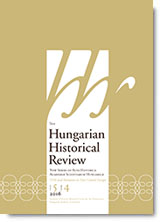God Brought the Hungarians: Emigration and Refugee Relief in the Light of Cold War Religion
God Brought the Hungarians: Emigration and Refugee Relief in the Light of Cold War Religion
Author(s): James P. NiessenSubject(s): Post-War period (1950 - 1989), Cold-War History, History of Religion
Published by: Magyar Tudományos Akadémia Bölcsészettudományi Kutatóközpont Történettudományi Intézet
Keywords: religion; Hungarian refugees; Catholic Relief Services; World Council of Churches; Camp Kilmer
Summary/Abstract: The ample literature on the Hungarian refugee crisis of 1956/57 has focused on its diplomatic and political aspects, mentioning the role of religions and faith-based organizations only in passing. This study seeks to address this lacuna by focusing on religion as an element of the Cold War, a motive for emigration, and an organizing framework for refugee relief. The chronology begins with the end of World War II. Austria, the country of first asylum, and the United States, the dominant financier and resettlement country, are the primary geographic focus. Reflecting the preponderance of Catholics in the Hungarian migrants’ population, special attention is given to Catholic Relief Services, though Jewish aid organizations and the World Council of Churches are not neglected.
Journal: The Hungarian historical review : new series of Acta Historica Academiae Scientiarum Hungaricae
- Issue Year: 6/2017
- Issue No: 3
- Page Range: 566-596
- Page Count: 31
- Language: English

